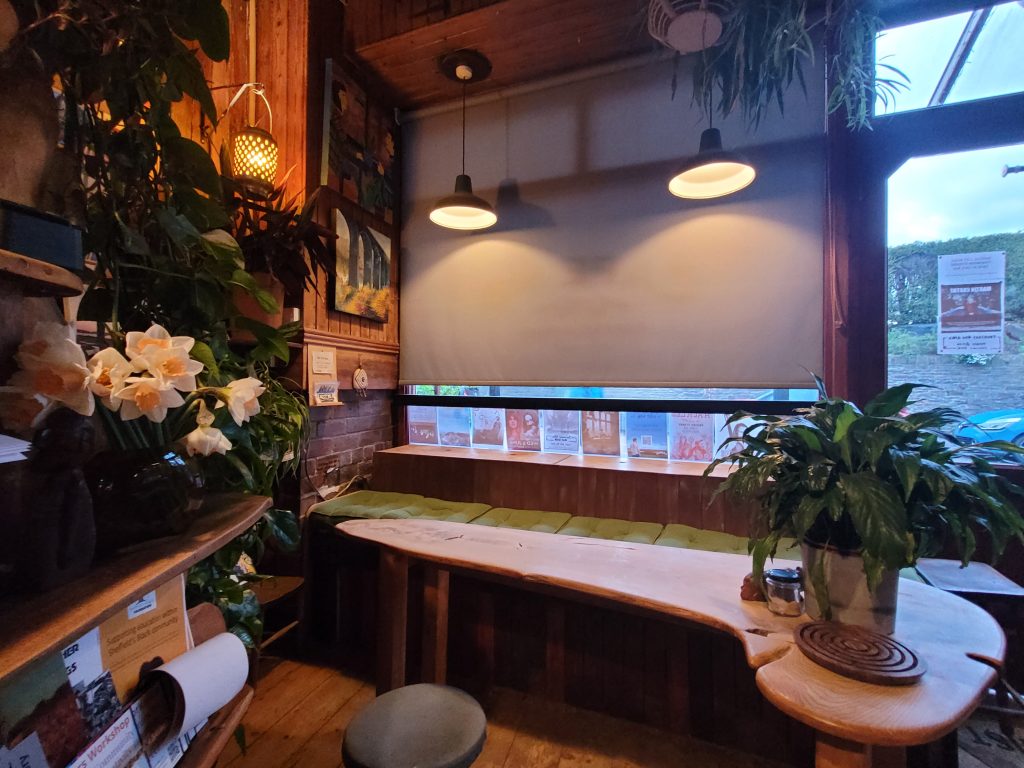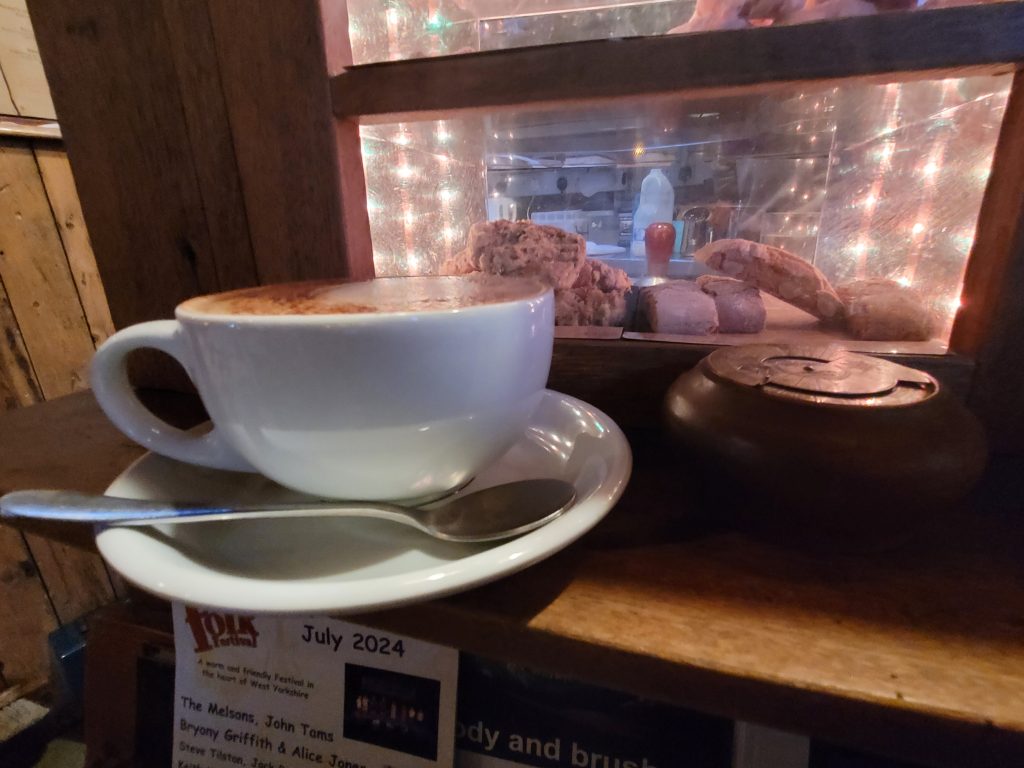We return to Cafe #9 for the first time in a long while.
Small, cosy and bursting with colour and adventure in decor (and cake selection), we regret its taken this long to come back; the good coffee and music is always worth the journey. There is a gentle glow from the fire that burns away though cold edges, it is a place where it looks like magic is going to happen.
We come to see Daria Kulesh, a folk singer from Russia who has made roots in England over the past 15 years. Her music is described in the media as ““Haunting and enigmatic” by the Sunday Times, and “Intensely personal” by Twitchfolk, and overall something a bit different. Her music largely covers family stories and famous people of historical Russia and Ingushetia (North Caucaus). Daria’s music has been sharpened like a battle knife in recent years, she sings in a number of configurations such as part of Michell, Pfeiffer and Kulesh, and also as a duo with Marina Osman, but today she is by herself. When performing solo, her music turns a little to the East, bringing the promise of culture, family and personal recollection of a persecuted people. With these stories creates a sharp, bright gem of memory, something quite unusual and fascinating to an audience not in the know about her set.

Kulesh has picked up listeners from around the world for her tour; the set draws in online watchers too as her laptop has a bunch of people peering through their small windows into this little slice of comfort and hygge. In terms of what to expect, Kulesh’s voice is one of those classical sounding timbres, smooth and laced with spice that wrenches on the heart strings. It is no surprise that people come back to see her from afar. Her set is a mix of unaccompanied voice, shruti box and acoustic guitar too for when a change of pace is needed.
Daria set begins with it’s focus on the theme of marriage. There is “Safely Wed” a song about an arranged marriage which ends badly. A song on contrasts, it’s floaty “Oil and milk never mix, milk and bread much better bet” orbits the brilliant message of marrying for love, even when it might be less conventional to outside eyes. Even when Kulesh goes from the personal to the bigger picture, she returns often to these quiet stories throughout the set.
A recent addition to the playlist is Kulesh’s delve into the persona of the leader, nun and spirit in “Ataman”. Here she describes the main subject, Alyona of Arzamas, a 17th Century female rebel fighter like Joan of Arc as a religious leader and warrior. Having a life of studying medicine, becoming a nun and joining the peasants’ revolt she was burned at the stake when she was captured and would not reveal her secrets. In a rich contrast to a more humble stage persona, Kulesh brings the wrath and glowing hot coals of war as she sings, “If you burn me, I won’t scream”. It is one of her most energetic and relentless numbers; it is pretty fierce, like an Amur Tiger from Siberia. The song fits her set well, you could call it a song about “Girl Power” but Alyona would probably be able to crush the Spice Girls skulls. It is always a pleasure to hear about warrior nuns; there aren’t enough of them in the song or real world (they are probably practicising their chokeholds in secret).
Kulesh opened the book on a story about her Great Grandmother who married a pilot, which was an unconventional act as she had been married before; “The Moon and the Pilot” is one of her iconic tracks whose research for led her to travel to Ingushetia. Beautiful and poignant, it is an important track and popular track for Kulesh which is epic not just as a love story but with the background of the Ingush and their struggle following Stalin’s orders. It’s lyrics are like outstretched hands under twinkling moonlight, “Shine my moon, your face made of light. Let down you hair, black is the night”. Somewhat of a focusing laser for Kulesh’s strengths as a writer, the wonder of Ingush stories course through the songs like the butter in a Caucasus Chudu flatbread. There is a pride here, her love is exhibited for all to see, and like a satin cloak it is an incredible flourish to Kulesh’s general work.

A rousing point of the set for the audience is a rendition of “Those were the days” showcasing Kulesh’s multi-lingual talents as she sings this well-travelled song. She gives us verses in English, French, German and Russian. She glows in the wonder of this viral song, which she explains feels like a song that has taken root abroad in stronger soil than it’s home turf. It is much a story of Kulesh herself and her musical journey and very welcome here.
In summary, it’s a special night, one to revel in the spell-binding quality of music and story. It is always good to hear songs about far away and Kulesh is a master at making the distant close, and the different familiar. She has a quiet joy about Caucasus cultural history and her family story whose narrative in the UK folk music scene is not shared by anyone else we are aware of, but one she shares with so much enthusiasm.
More information can be found about gigs at Cafe #9 at https://www.wegottickets.com/Cafe9
#For more information about Daria Kulesh, go here.
